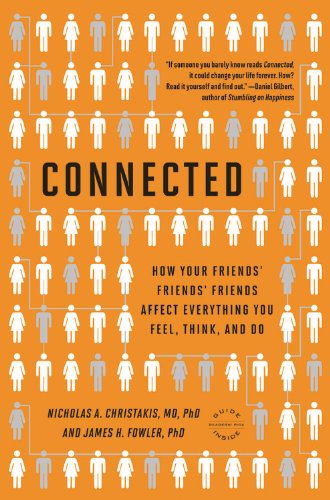When my wife and I were buying our first home in 1999, I quickly tired of hearing the real estate and lending professionals tell us that we’d be in the house only three years. They were going on the statistics and I just hated being thought of as a data point. After all, we were different, special, captains of our own ship and all of that.
We sold the house in 2001. So much for being different.
It’s hard to go against the flow, to swim upstream, to be the outlying dot on the scatter chart. Despite American’s tendency to see everyone else doing the same thing and think, “Oh, I’m different, I march to my own drumbeat,” the truth is that none of us is all that different. Our attitudes and behaviors and shaped by the people around us and, in turn, we help shape the attitudes and behaviors of other people.
What we’re talking about here is “social influence.”
Nicholas Christakis is one of the pioneers in this field. Christakis directs The Human Nature Lab (which sounds either really cool or kind of creepy) at Yale University and in his book Connected he describes just how powerful is the influence of not just our friends, but also the friends of our friends. For example, did you know that having the friend of a friend quit smoking will make it much more likely that you will also quit smoking?
Smoking may be contagious, but so it quitting. Such is the powerful influence of the people around us. And the power goes both ways: your social networks can help you quit smoking, but they can also make you fat. In another study, Christakis shows that our ideas about what’s a normal amount of food or exercise, and what counts as a normal body size, all seem to be influenced by the people to whom we're connected. Having these socially-influenced “norms” greatly shapes, well, our shape.
Similar research is at the heart of Jonah Berger’s recent book, Invisible Influence: The Hidden Forces that Shape Behavior. While Christakis approaches these issues from a medical angle, Berger does so as a marketing professor at the Penn’s Wharton Business School. Berger tells a story about his father, a lawyer in the DC area, who complained that all DC lawyers drive BMWs. His father had just bought a BMW, but assured his son that he was different – after all he’d bought a blue one, while all the other lawyers drove gray beamers. While social influences are strong (almost inescapable), none of us thinks they apply their mysterious forces on our decisions.
Berger shows that the very presence of other people can make improve or decrease our performance. If you’re a bit nervous about parallel parking, you’ll likely do it worse under the watchful gaze of others. However, having a biking partner will help you pedal harder, a running partner will help you run faster, or a swimming partner will influence you to make it back and forth across the pool in less time that you would alone. It seems that social pressure brings out our best when it comes to simple tasks or activities we find easy, but tampers our performance when it comes to challenging tasks or things we need to figure out as we go.
It seems that social influence is a bit like gravity: it’s an invisible force that pushes and pulls us in predictable ways. So rather than fight gravity, we need to work with it. How do we do that? Use social influence to your advantage by being selective in the communities and networks that you choose to inhabit. Discern what kind of person you really want to be (I’d suggest reading the New Testament for help with this), and then selectively socialize with people who reflect those values, traits, and tendencies. Place yourself in social networks that bring out the best in you and avoid those that pull you away from the ideal. Or, as my crazy uncle used to say: “It’s hard to fly with the eagles when you’re surrounded by turkeys.”
How about you? How are your social networks influencing you for good? For bad? Where could you use some social upgrades? What’s a habit you’d like to start (or kick)? How could friends (and friends of friends) help? Where have you seen the power of social influence in your own life?


